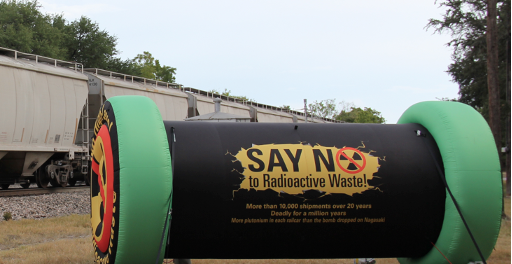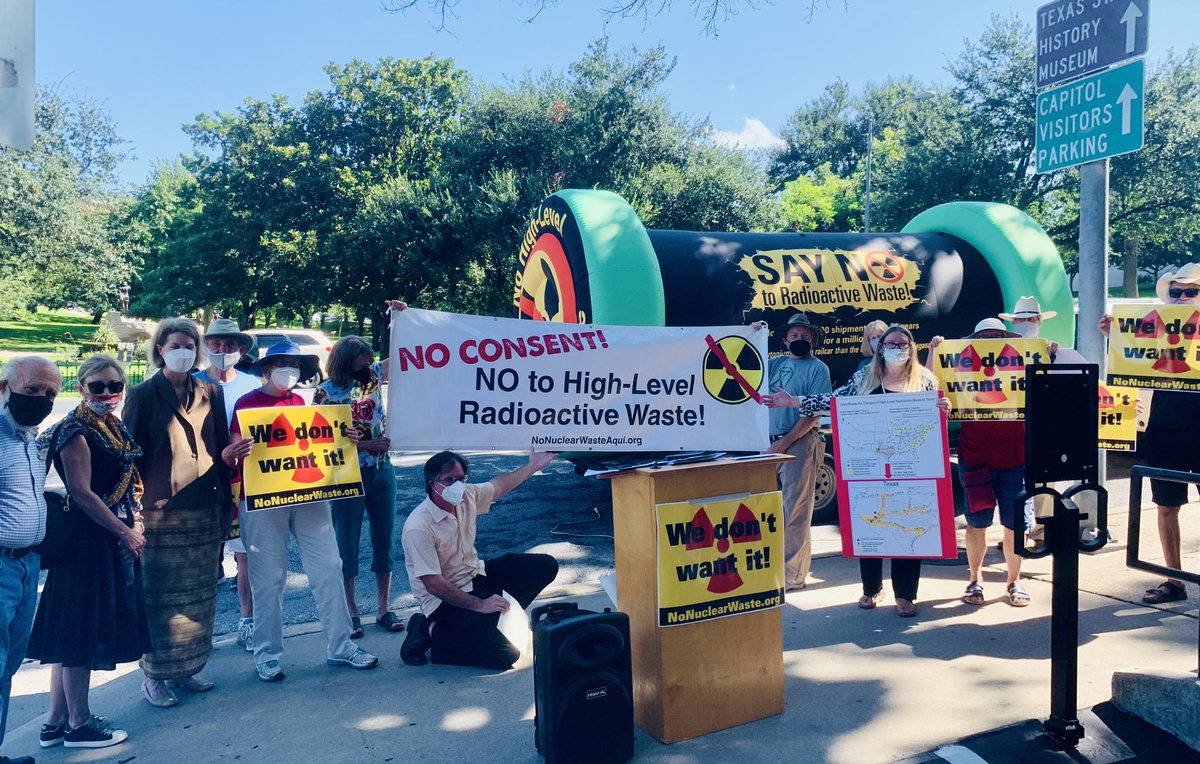
Photo: A full-scale model of one transport cask for high-level radioactive waste transport is shown above, measuring 14 ft. long and 8 feet in diameter. Fully loaded rail packages could weigh 180 tons, and adding the weight of a rail car, exceed the weight limit of many rail lines, posing a derailment risk. An accident could devastate a 50-mile area and create a radioactive cloud exposing areas far from the accident. While it would not be bomb-grade, a single rail car could carry as much plutonium as was in the bomb dropped on Nagasaki. (Photo Courtesy of Angel Amaya)
By Carolyn Croom and Karen Hadden
Nuclear Subsidies
The reconciliation and bipartisan bills in Congress contain roughly $35 billion in subsidies to the nuclear industry, mostly in production tax credits for existing uneconomical commercial nuclear power plants. The Sierra Club is strongly opposed to this bailout. Clean, renewable energy produces more jobs and is much less expensive than dirty, dangerous, and unjust nuclear energy, and any money diverted from renewable energy slows down climate mitigation. Here is a letter to Senate Majority Leader Schumer and Speaker Pelosi from the Sierra Club addressing this issue.
Assuming the bills are still in Congress when you read this, you can take action here: National Bailout Action Alert - October Update.
Nuclear Waste Dump
The Nuclear Regulatory Commission (NRC) granted a license on September 13th to Interim Storage Partners (ISP) to dump high-level radioactive waste in Andrews County, Texas, near Odessa. A group of volunteers and staff at the SEED Coalition, Sierra Club, Public Citizen, and League of Women Voters have worked this year to oppose this license application for above-ground storage in a Consolidated Interim Storage facility (CIS), to be operated by Waste Control Specialists (WCS). Holtec International proposes a similar facility in nearby New Mexico. Both projects should be considered illegal under the Nuclear Waste Policy Act since CIS facilities are illegal when no deep, permanent U.S. repository exists. Both facilities would result in thousands of risky rail shipments of radioactive waste through Texas and 43 other states, jeopardizing the safety of anyone living or working nearby, and posing an environmental justice threat both during transport and at the sites. Bringing this nuclear reactor waste to Texas and New Mexico would likely result in dangerous de-facto permanent dumps. The Texas site would be right next to the Ogallala Aquifer, posing a grave threat to our water resources.
Our group worked to collect signatures from Texas legislators for a letter in opposition to the dump. Sixty-three legislators wrote to the NRC on July 23rd, asking that CIS licenses for Texas and New Mexico be denied. The letter was also sent to Jennifer Granholm, Secretary of the Department of Energy, an agency that is updating “consent-based siting” criteria. We also testified in the state legislature on two radioactive waste bills, including HB 7 in the Second Special Session. We recently held a press conference in Austin and a protest outside the NRC Regional Office in Arlington, TX as well. Opposition at the city, county, state, and federal levels demonstrates that Texans clearly do not consent to this dangerous threat to the environment and public health. Resolutions opposing the dangerous project have been passed by cities and counties representing 5.4 million Texans. They include Dallas, Bexar, El Paso, Midland, Nueces, and Andrews counties and the cities of Midland, San Antonio, and Denton. School districts and the Midland Chamber of Commerce wrote to the NRC about their concerns as well.

Photo: At the August 25th press conference, Cyrus Reed spoke (pictured seated), as well as Texas Representative Vikki Goodwin, Karen Hadden of the SEED Coalition, Adrian Shelley of Public Citizen, and Tom “Smitty” Smith. A letter from U.S. Rep. Lloyd Doggett was also presented. A full-scale model of one transport cask for high-level radioactive waste transport is shown above, measuring 14 ft. long and 8 feet in diameter. Fully loaded rail packages could weigh 180 tons, and adding the weight of a rail car, exceed the weight limit of many rail lines, posing a derailment risk. An accident could devastate a 50-mile area and create a radioactive cloud exposing areas far from the accident. While it would not be bomb-grade, a single rail car could carry as much plutonium as was in the bomb dropped on Nagasaki. (Photo Courtesy of Mike Coleman)
On September 9th, Governor Abbott signed into law a bill designed to halt the Texas Commission on Environmental Quality (TCEQ) permits required to build and operate a CIS facility. Overwhelming opposition to high-level radioactive waste storage in Texas was demonstrated with the passage of HB 7 unanimously in the Senate and by 119-3 in the House. Such a strong bipartisan vote is rare in Texas these days. Cyrus Reed, Conservation Director for our Lone Star Chapter, stated, “This bill will help support our legal case opposing licensing for high-level radioactive waste storage, which is now at the D.C. Circuit Court of Appeals.” SEED Coalition, Beyond Nuclear, and a coalition of oil and gas industries led by Fasken Oil and Ranch also have cases on appeal. On September 23rd, the Texas Attorney General filed suit against the NRC, calling the ISP license unlawful and requesting that it be vacated. The Governor’s filing and other documents are online at www.NoNuclearWaste.org. The Sierra Club is also pursuing additional legal appeals related to flaws in the NEPA process that led to a “Finding of No Significant Impact.”
Other projects have been licensed by the NRC, but were never built, including two additional proposed Texas reactors and Private Fuel Storage's plan for high-level radioactive waste in Utah. We're going to keep fighting! For more information or to join fellow Sierrans and others in taking action, please contact Carolyn Croom at cbcroom@sbcglobal.net or Karen Hadden at karendhadden@gmail.com.